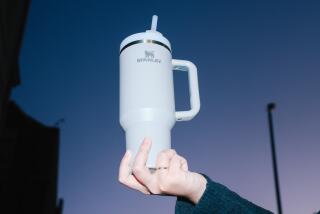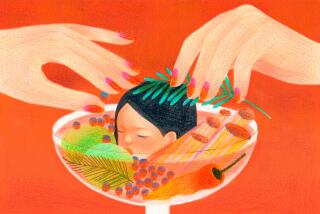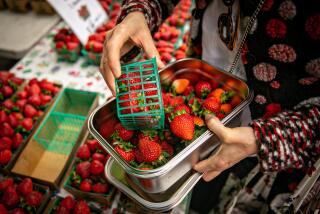A clear advantage with glass
- Share via
There’s a reason wine and spirits are stored in glass: purity of taste. Plastic (and, to a lesser degree, metal) can impart various “flavors” into the liquids it comes into contact with. But that’s just one reason that glass is an increasingly popular alternative to plastic and aluminum or stainless steel sport-style bottles.
Another is peace of mind. About five years ago, scientists and the Food and Drug Administration started issuing warnings about bisphenol A, commonly called BPA, a chemical used in plastics and in the linings of some metal vessels. Then, in 2010, the FDA recommended that parents avoid using bottles and cups containing BPA when feeding infants. That warning was enough to prompt many plastic-bottle manufacturers to start making BPA-free bottles. And it motivated many consumers to look for alternatives for their older children and themselves.
Enter glass.
“Glass is made from naturally abundant materials -- primarily sand -- and it won’t degrade over time,” says Scott Radcliffe, a spokesman for glass-bottle manufacturer Lifefactory, which is based in Sausalito, Calif. Plus, “glass can last for decades,” he says.
The glass used for food and beverage containers doesn’t leach chemicals, nor will using glass to hold beverages other than water -- i.e. sports drinks -- affect the material or absorb residual tastes or odors. Glass bottles are also safe to clean in a dishwasher, and it’s easy to see when they are sufficiently clean -- something that’s not always clear with plastic or metal containers.
Of course, there’s a downside: Glass is breakable. The glass used for sports beverage bottles is very durable, but many companies are adding an extra layer of protection by wrapping the bottles in protective silicone sleeves. Another downside is that glass bottles are more than twice as heavy as plastic or metal. While carrying a glass bottle to yoga or Zumba or stashing one in the cage of a bike is one thing, hikers might be wary of carrying such a load.
--
--
(BEGIN TEXT OF INFOBOX)
--
Switching bottles? Pore over this selection
If you’re in the market for an alternative to plastic or metal water bottles, here are a few options.
--
Lifefactory Flip Top
Holds: 22 ounces
Weighs: 19 ounces unfilled
Price: $24.99
The cap at the mouthpiece is attached but flips back for sipping. The bottles are slightly curved, making them easy to hold.
www.lifefactory.com
--
CamelBak Eddy Glass
Holds: 24 ounces
Weighs: 18.4 ounces unfilled
Price: $24.95
Made with CamelBak’s signature bite valve: Just bite and sip; no tipping required.
shop.camelbak.com
--
Rive Savoy
Holds: 16 ounces
Weighs: 13.2 ounces unfilled
Price: $20
To sip, slightly twist the top and the mouth opening adjusts (kind of like a spice bottle). These bottles are very slim and designed to fit in most car cup holders.
www.riveusa.com
--
Takeya Classic
Holds: 22 ounces
Weighs: 17 ounces unfilled
Price: $19.99
This super-sleek bottle is nearly covered in a solid silicone sleeve.
www.takeyausa.com
--
Dana Sullivan Kilroy
--
Put new life into a plastic water bottle
If you’ve been bothered by residual odors and/or tastes in your BPA-free plastic bottles, don’t banish them to the landfill. Instead, rinse them with an antibacterial mouthwash to get rid of any unpleasantness.
If that doesn’t work, clean them the way the gear gurus at REI suggest:
1. Put a teaspoon of bleach and a teaspoon of baking soda in the bottle and fill with water.
2. Let the solutionsit overnight
3. Rinse well or run through the dishwasher.
4. Let the bottle air-dry completely.
BPA, or bisphenol A, is an industrial chemical used in food and beverage containers since the 1960s. The U.S. government offers additional information at lat.ms/1fcaTnA or lat.ms/Q8XbfP.
--
Dana Sullivan Kilroy


